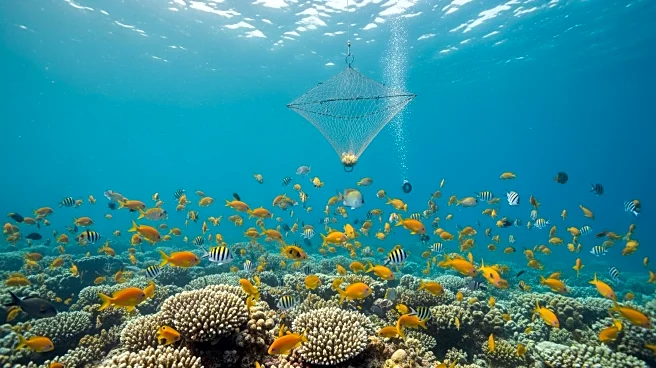What's Happening?
A study conducted by the University of Exeter has revealed that adherence to angling guidelines significantly reduces shark mortality rates. Researchers tagged nearly 70 sharks, including blue, porbeagle,
and tope species, to monitor their behavior post-capture using the catch-and-release technique. This method, aimed at conserving shark populations, involves returning the fish to the water after capture. Despite concerns from animal rights groups about potential injury or death, the study found that only three sharks died when best practice guidelines were followed. The tags, which remained attached for up to 45 days, provided data on the sharks' depth and movement after release. The research team, including members from Edinburgh Napier University and the Government of Jersey, noted that the sharks swam quickly to deep water post-release, likely to re-oxygenate their gills.
Why It's Important?
The findings of this study are significant for conservation efforts, as they suggest that following specific guidelines can minimize harm to shark populations during recreational fishing. This has implications for environmental policy and the management of marine ecosystems, particularly in regions where recreational fishing is popular. By demonstrating that most sharks recover within 24 hours, the study supports the viability of catch-and-release as a conservation strategy. This could influence regulations and practices among non-commercial fishermen, potentially leading to more sustainable fishing practices that protect vulnerable shark species.
What's Next?
The study's results may prompt further research into the long-term effects of catch-and-release fishing on different shark species. Additionally, there could be increased advocacy for the adoption of these guidelines among recreational fishermen. Policymakers might consider integrating these findings into broader conservation strategies, potentially leading to new regulations that mandate best practices for catch-and-release fishing. This could also spark discussions among environmental groups and fishing communities about the balance between recreational fishing and marine conservation.
Beyond the Headlines
The study highlights the ethical considerations of recreational fishing and its impact on marine life. It raises questions about the responsibility of fishermen to adhere to guidelines that protect wildlife. Furthermore, the research underscores the importance of scientific studies in shaping public policy and conservation efforts. As awareness grows, there may be a cultural shift towards more responsible fishing practices, reflecting a broader commitment to environmental stewardship.









